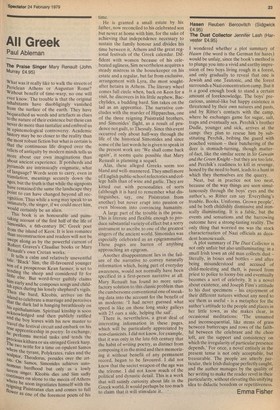All Greek
Paul Ableman
The Praise Singer Mary Renault (John' Murray £4.95) What was it really like to walk the streets of Periclean Athens or Augustan Rome? Without benefit of time-warp, no one will ever know. The trouble is that the original inhabitants have disobligingly vanished from the surface of the earth. They have bequeathed us words and artefacts as clues to the nature of their existence but these can never do more than tantalize and embroil us in epistemological controversy. Academic history may be no closer to the reality than the most robust fiction but what is certain is that the continuous life draped over the relicts of antiquity by modern minds tells us more about our own imaginations than about ancient experience. If potsherds and Pyramids are intrinsically enigmatic, what of language? Words seem to carry, even in translation, meanings securely down the ages, but the truth is that while the signposts have remained the same the landscape they Point to can have changed beyond all rec9gnition. Thus while a song may Speak to us intimately, the singer, if we could meet him, would certainly be an alien. This book is an honourable and painstaking account of the first half of the life of Simonides, a 6th-century BC Greek poet from the island of Keos. It is less romance than reconstruction and readers will not be swept along as by the powerful current of Robert Graves's Claudius books or Mary Renault's own Cretan works. It tells a calm and relatively uneventful tale. 'Black' Sim, the ill-favoured younger SO n of a prosperous Kean farmer, is set to tending the sheep and considered fit for tittle else. But word-fever guiltily claims 11.1m early and he composes songs and childish epics during his lonely shepherd's vigils. Then the bard, Kleobis, arrives on the that to celebrate a marriage and perceives I..at the dark lad is hanging breathlessly on his epithalamium. Spiritual kinship is soon acknowledged and then publicly ratified and the boy leaves with his new master to .travel the festival circuit and embark on his true apprenticeship in poetry. In exchange; he performs menial tasks and tends the kithara or six-stringed Greek harp. The two settle for a time on opulent Samos Where the tyrant, Polykrates, rules and the sci Theodorus, presides over the artSts. On Samos, Simonides achieves autonomous bardhood but only as a lowly __Lavern. singer. Kleobis dies and Sim sadly _co.ntinues on alone to the mecca of Athens .wil,er! he soon ingratiates himself with the Lelegoin5 Pisistratan clan and comes to full ower as one of the foremost poets of his time.
He is granted a small estate by his father, now reconciled to his celebrated son but never at home with him, for the sake of achieving that independence necessary to sustain the family honour and divides his time between it, Athens and the great regional festivals of the Greek calendar. Dif fident with women because of his cele brated ugliness, Sim nevertheless acquires a steady mistress in the housekeeper on his estate and a regular, but far from exclusive, arrangement with Lyra, the most soughtafter hetaira in Athens. The literary wheel comes full circle when, back on Keos for a visit, he discovers in his little nephew, Bacchylides, a budding bard. Sim takes on the lad as an apprentice. The narrative con cludes with the murder of Hipparchus, one of the three reigning Pisistratid brothers, and Simonides' flight, as a result of pru dence not guilt, to Thessaly. Since this event occurred only about half-way through the life of the historical Simonides and since some of the last words he is given to speak in the present work are 'We shall come back again', it seems quite possible that Mary Renault is planning a sequel.
Alas, these alleged Greeks seem too bland and wellmannered. They smell more of English public-school refectories and col lege halls than of wine and garlic. They are kitted out with personalities of sorts (although it is hard to remember what dis tinguishes, say, one Pisistratan from another) but never erupt into passion or even blossom into convincing humanity.
A large part of the trouble is the prose. This is literate and flexible enough to produce substantial variety of effect but a sorry instrument to ascribe to one of the greatest' singers of the ancient world. Simonides was especially celebrated as an epigrammatist. These pages are barren of anything approaching an epigram. Another disappointment lies in the failure of the narrative to convey naturally information which, being part of everyday awareness, would not normally have been specified in a first-person narrative at all. Mary Renault has found no more satis factory solution to this classic problem than the cumbersome conventional one of sneak ing data into the account for the benefit of us moderns: 'I had never guessed what speed is like on those long snaky galleys with 25 oars a side, helping the sail'.
There is, nevertheless, a great deal of interesting information in these pages, which will be particularly appreciated by non-classicists. I did not know, for example, that it was only in the late 6th century that the habit of writing poetry, as distinct from composing it in the mind and then memorizing it without benefit of any permanent record, began to be favoured. I did not know that the secret weapon of the age was the trireme. I did not know much of the political and dynastic detail. This is a work that will satisfy curiosity about life in the Greek world. It would perhaps be too much to claim that it will stimulate it.


































 Previous page
Previous page